- EPA-estimated range of around 300 miles
- Three years of free charging on the Electrify America network
- Optional Highway Assistant allows for hand-free driving
Review: Is the 2023 BMW i7 More Than an Electric 7 Series?
The new 7 Series goes electric
What is the BMW i7?
BMW entered the luxury EV market years before many rivals when it introduced the i3, and it's continued to roll out new all-electric models since that odd but charming little hatch debuted. The latest is the 2023 BMW i7, the all-electric variant of the redesigned 7 Series sedan, BMW's long-serving four-door flagship model.
While the i7 is an all-new vehicle, unlike rivals like the Mercedes-Benz EQS, it's not a bespoke EV platform. Rather the new 7 Series was designed with gasoline and electric powertrains in mind. In the i7, a battery pack and an electric motor at each axle replace the 7 Series' standard gasoline powertrain. The two cars are very similar, but there are some key differences when it comes to comfort, driving dynamics and price.
How much power and range does the i7 have?
BMW recently announced the i7's EPA-estimated range, with models rated from 296 to 318 miles on a single charge, depending on the wheel and tire option. Those figures are on the lower end for a full-size luxury EV, especially when compared to EQS or the 500-plus mile range of the Lucid Air. That said, the BMW i4 and iX significantly outperformed their EPA estimates in Edmunds' real-world EV range testing (something that can't be said for either Tesla or Lucid), so we wouldn't be surprised to exceed 300 miles in our testing.
While the traditional 7 Series draws power from mild hybrid six- or eight-cylinder engines, the i7 comes with a battery pack with 101.7 kWh of usable power and two electric motors driving the front and rear axles for all-wheel drive. Combined output is 536 horsepower and 549 lb-ft of torque, which is strong enough to accelerate the i7 to 60 mph in a touted 4.5 seconds. That's respectably quick, though the Lucid Air and Tesla Model S are quicker still.
The i7 is capable of 195-kW DC fast charging, which should enable it to replenish up to 80 miles of range in only 10 minutes. As a plus, free charging will be available at Electrify America stations for the first three years of ownership. And unlike models such as the BMW i4 and iX, there's no 30-minute limit for free charging.
What does it compete with?
The Mercedes-Benz EQS sedan is as direct a competitor as you'll find for the BMW i7. Both represent all-electric versions of traditional gas-powered luxury flagships and showcase all of the latest technological innovations. Unlike the Benz, which has a more affordable EQS 450+ rear-wheel-drive base model available, the i7 will only be offered as the all-wheel-drive xDrive60. It starts at $120,295 and is priced similarly to the upgraded EQS 580 4Matic.
Features are also similar between the two, with adaptive air suspensions, four-wheel steering, large, full-color head-up displays, and self-parking systems. All are available as standard or optional equipment. BMW's iDrive infotainment system also receives some upgrades to challenge Mercedes' praiseworthy MBUX system, including augmented reality overlays for navigation and an enhanced list of voice commands
How does it drive?
As you might expect, the i7 rides and handles similarly to a 7 Series. The i7's heavy battery pack means it weighs more than the 7 Series, but the powerful electric motors mean that extra weight doesn't slow it down. The powertrain is smooth most of the time, providing gentle power that's more than enough for passing in the city or merging on the highway. Select Sport mode and throttle response sharpens, making the i7 feel even quicker. It has a nice soundtrack, too, with a Hans Zimmer-composed swell that emits from the speakers when you floor it.
The extra weight means it doesn't handle quite as well as the 7 Series. The steering doesn't provide as much feedback, and the car itself tends to lean more when turning. We found the ride to be a hair stiffer than the 7 Series, too, though it's far from harsh. The suspension absorbs bumps, but it doesn't mute them as well as the EQS. It's a little more engaging than the non-AMG EQS, but the i7 is no sport sedan. The i7 is a large car, but standard rear-axle steering makes it easy to park and turn around in tight spaces by turning the opposite direction of the front wheels at low speeds.
The i7 is capable of one-pedal driving, though you have to select the mode with the shifter every time you drive. Cars like the EQS and Model S remember if you prefer one-pedal driving. We also found the i7 to be a bit loud on the road, with more road and tire noise than we expect from a luxury car, especially an electric one.
The i7 is available with a wide array of driver aids, including BMW's hands-free highway driving technology called Highway Assistant. On certain stretches of highway, the i7 can accelerate, brake and even change lanes with the tap of a turn signal, though you should always be ready to take over the wheel.
What's the interior like?
Basically identical to that of the 7 Series. It's a huge departure from the previous 7 Series. That's both good and bad, depending on what we're looking at. The overall design is handsome, with lots of nice materials on all of the surfaces. Leather is available, though we really like the available cashmere seating surfaces. We'd like to see more premium fabric interiors like this one. We weren't as fond of some of the glossy interior trim as it tended to reflect light in bright sunlight.
The driver-oriented dashboard is topped by two large screens under one long, slightly curved piece of glass. It's impressive and houses the new infotainment system. BMW's latest infotainment system packs a lot more features than the outgoing system, but the interface and layout aren't very intuitive. We have to take our eyes off the road for longer than we'd prefer to do things like change the temperature or change the station. BMW's voice command system helps here, as it can do everything from set a temperature to lowering the rear window shades. We just wish we didn't have to rely on the system as much.
The rear seat is arguably more impressive, especially when equipped with a frankly massive 31-inch, 8K rear entertainment screen with built-in Amazon Fire TV. The resolution is great, but the ultra-wide aspect ratio doesn't match anything in movies or television, so the image will either be cut off or letterboxed. And despite the width, the screen is only capable of playing one thing at a time. Honda offered a wide (but much smaller) screen in the rear of the Odyssey that was capable of playing two things at once. When it's lowered, the i7's big display completely blocks the driver's view out of the rear window. That said, it's pretty slick to put the car in Theater mode. The rear shades raise and the screen lowers. Feels a bit like turning the lights down at a movie theater.
This is BMW's largest sedan, so there's plenty of space in both rows. If there's no one in the front passenger seat, the right rear passenger can use a touchpad built into the door to push the passenger seat forward and stretch out in the rear. With the right package, you can almost lay the seat flat.
How practical is it?
The i7 has a massive trunk, but unlike some other EVs it doesn't locate a front trunk where an engine would sit. The trunk's cargo area is wide and deep, but unlike some other sedans, the seats don't fold flat on all trims. Storage space in the cabin for small items is pretty good for a luxury vehicle, with sizable door pockets in each row as well as spacious consoles both front and rear. That said, the cargo area is smaller than the wide-opening hatches you'll find on the Tesla Model S and Mercedes EQS.
Edmunds says
For better or worse, the i7 simply looks, feels and drives like an electrified 7 Series. The tech-laden interior is impressive and the car drives well, but it doesn't feel as futuristic and forward-looking as rivals like the Mercedes EQS. There's a lot to like with the i7, but it doesn't advance the flagship EV experience in any significant way.
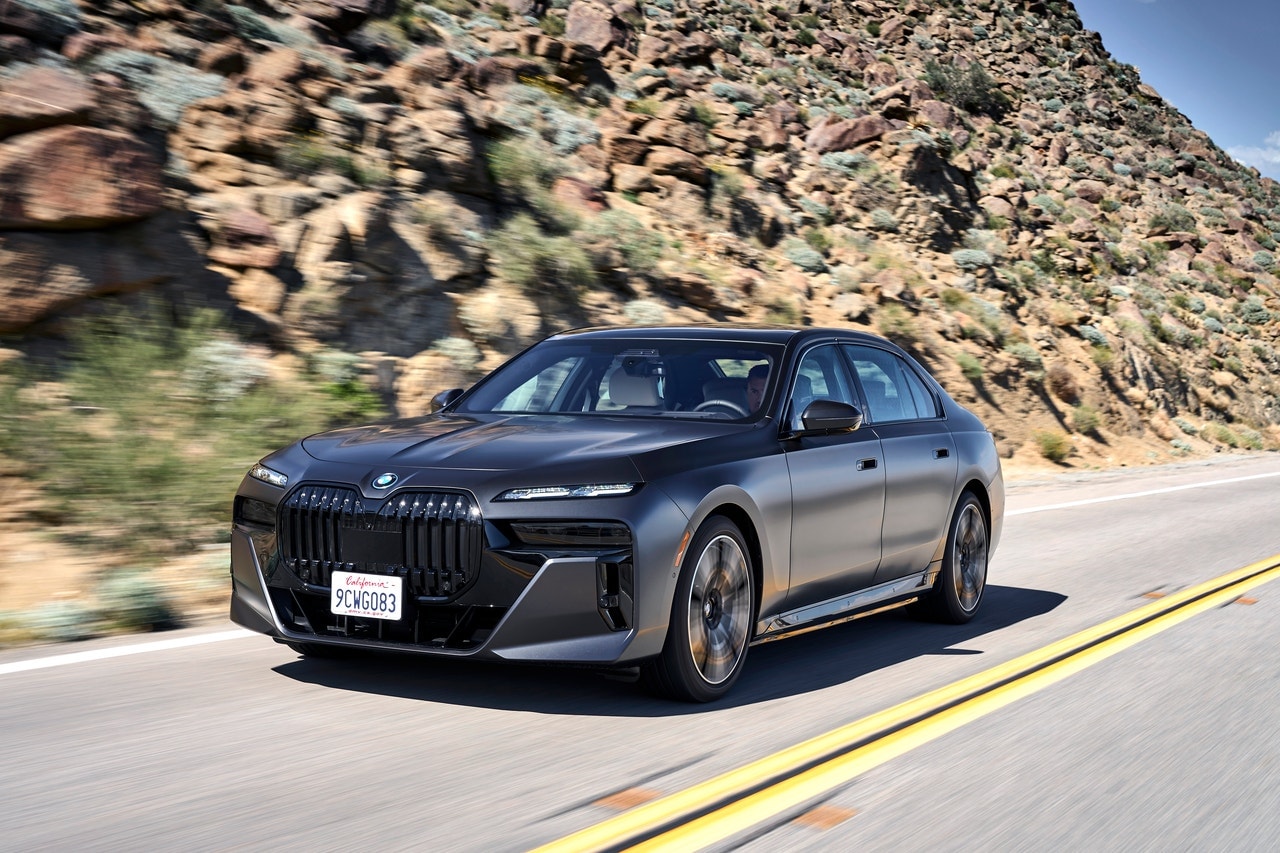


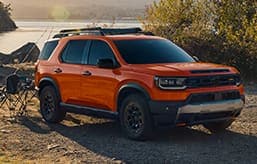

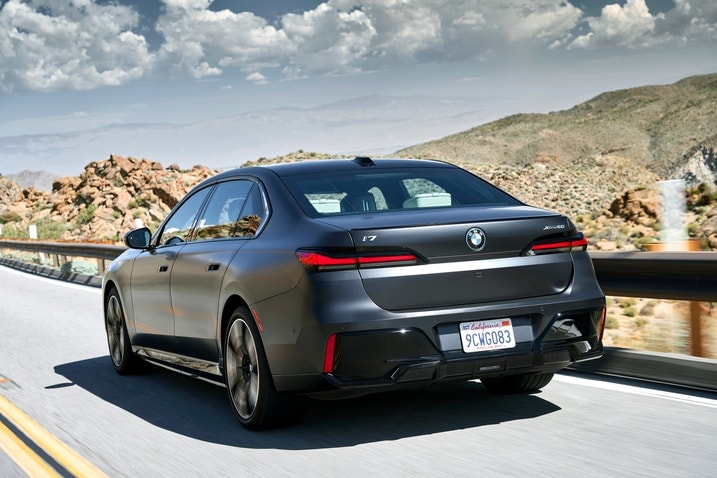

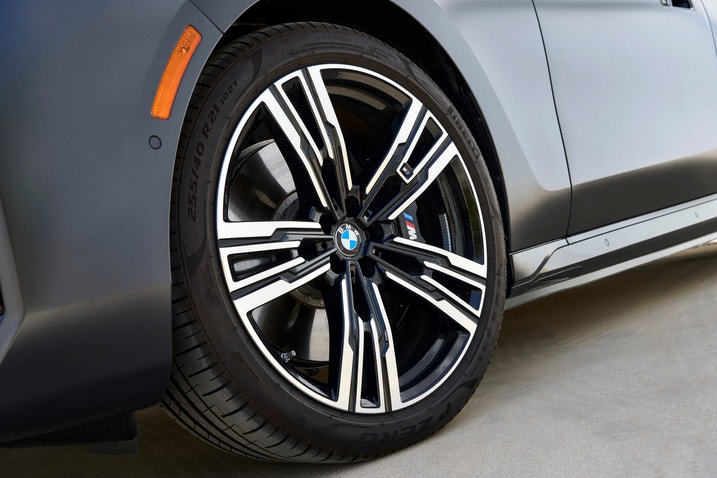
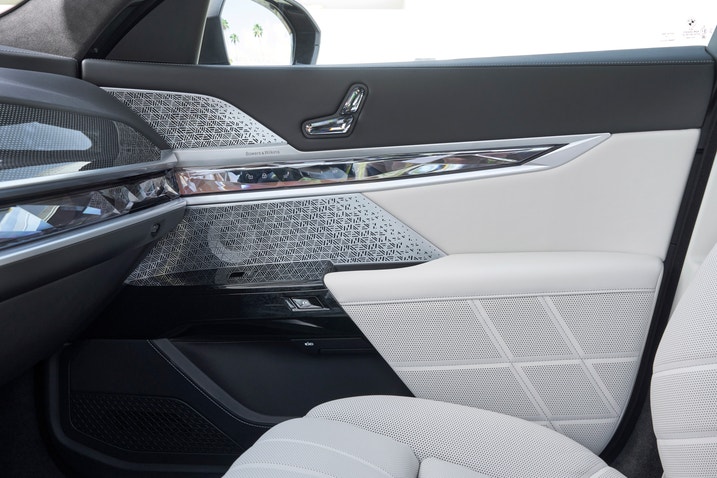

 by
by